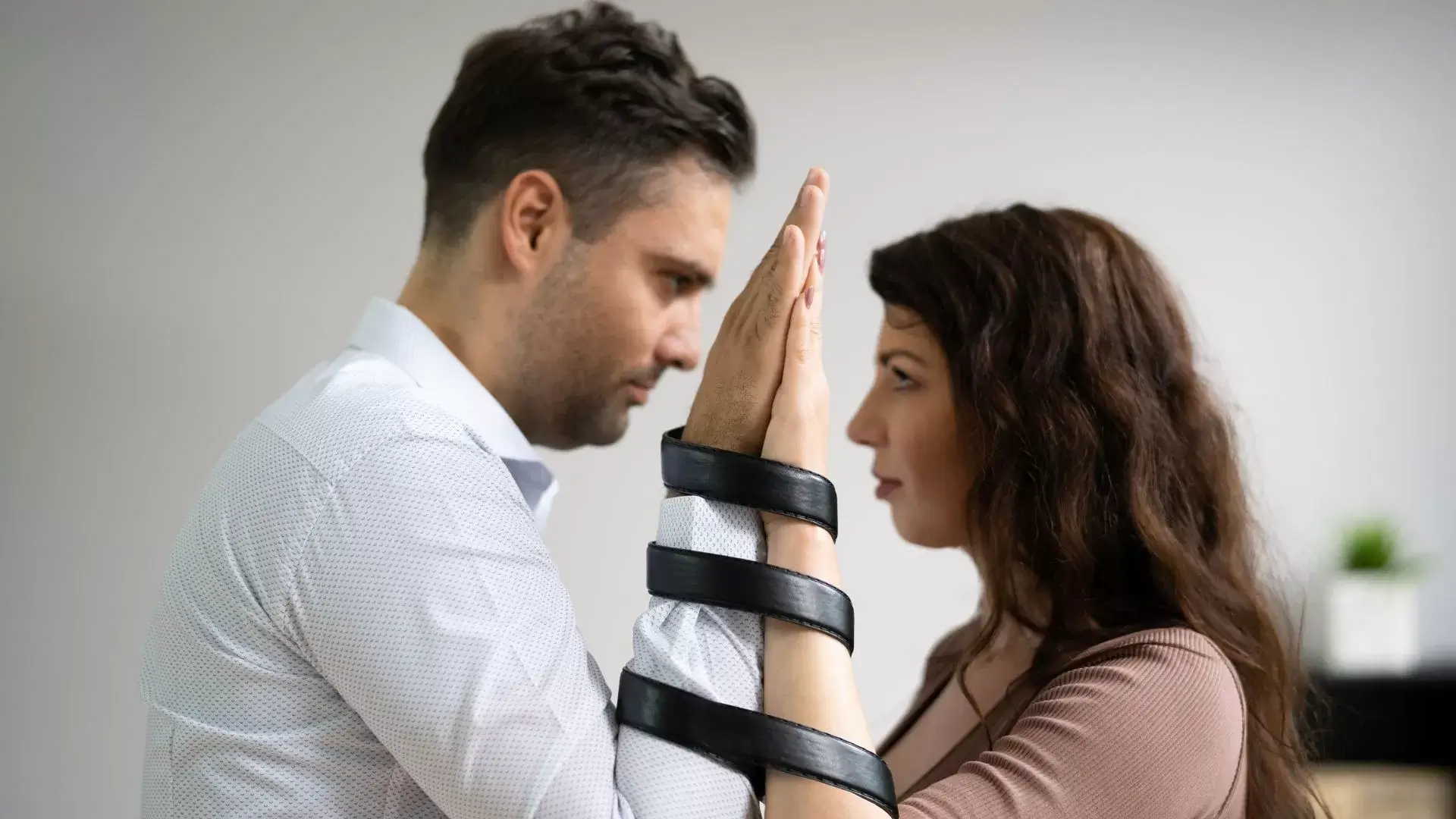Transforming codependent dynamics in abusive relationships starts with recognizing the emotional entanglement we’re trapped in. We often put our partner’s needs first, sacrificing our own well-being in the process. It’s crucial to establish self-awareness around our triggers and to communicate assertively about our boundaries. By fostering self-esteem and seeking support from therapists or groups, we can gain insights that help break these harmful patterns. Remember, we’re not alone in this struggle—community can make a significant difference. Exploring these concepts further can empower us to reclaim our autonomy and foster healthier relationships.

About Oakville Psychotherapist
At Oakville Psychotherapy, we recognize how codependent dynamics can impact relationships, and we’re here to help individuals navigate these challenges with compassion and expertise. Our team of trained professionals, including experienced Oakville psychotherapists, understands the intricate patterns that can develop in codependent relationships. We offer a safe space where clients can explore their feelings, learn about their behavioral patterns, and develop healthier communication skills.
Located conveniently at 243 North Service Rd W #106F, Oakville, ON L6M 3E5, we’re dedicated to supporting our clients through their healing journeys. By utilizing evidence-based therapeutic techniques, we empower individuals to break free from unhealthy dependencies and foster self-awareness.
Our approach is not just about addressing symptoms; we dig deeper to uncover underlying issues that contribute to codependency. We believe every person deserves to cultivate relationships based on mutual respect and independence. If you or someone you know is struggling with codependent dynamics, don’t hesitate to reach out. Call us at (647) 360-5880, and let’s commence on this transformative journey together. You’re not alone, and change is possible.
Understanding the Role of Codependency in Unhealthy Relationships
Codependency often manifests as a complex web of emotional entanglement, where one person’s needs overshadow their partner’s autonomy, leading to unhealthy relational patterns. We may find ourselves prioritizing our partner’s feelings and desires over our own, which can create a sense of imbalance. This dynamic often stems from a deep-rooted fear of abandonment or a need for validation, compelling us to sacrifice our own well-being.
As we navigate these relationships, it’s essential to recognize the signs of codependency. We might notice patterns of excessive caretaking, where we feel responsible for our partner’s happiness. This can lead to resentment and a lack of fulfillment in our own lives. It’s also common to experience anxiety when we think about asserting our needs, which reinforces our partner’s dependence on us.
To break free from these patterns, we can start by fostering self-awareness and setting healthy boundaries. Understanding our own needs is significant; we should allow ourselves the space to grow individually. By nurturing our self-esteem and independence, we create a foundation for healthier relationships, where both partners can thrive. Together, we can work towards transforming these dynamics into a more balanced, respectful partnership.

How Abuse Deepens Codependent Patterns in Relationships
Abuse often exacerbates codependent patterns, trapping both partners in a cycle of fear and dependence that can feel inescapable. When one partner uses manipulation or intimidation, the other may start to prioritize their abuser’s needs above their own, believing that this will prevent further harm. This dynamic reinforces the codependent behavior, making it harder for both individuals to establish healthy boundaries.
As we navigate these turbulent waters, we must recognize that the abuser often thrives on this dependency. They may exploit our fears, creating an environment where we feel we can’t survive without them. Our emotional responses become conditioned; we may feel guilty for wanting to assert our independence or express our feelings.
In these situations, it’s vital to understand that our self-worth is not tied to our ability to appease the abuser. The cycle of fear can make us feel powerless, but awareness of these patterns is the first step toward breaking free. By acknowledging how abuse deepens our codependent dynamics, we open the door to healing and reclaiming our autonomy. Together, we can begin to shift the narrative and foster healthier relationships.
Strategies for Altering Codependent Dynamics in Abusive Relationships
Recognizing the patterns that keep us trapped is the first step toward implementing effective strategies for altering the codependent dynamics that often arise in abusive relationships. We need to take a proactive approach, starting with self-awareness. By identifying our own triggers and reactions, we can begin to understand how our behaviors contribute to the cycle of abuse.
Next, let’s establish boundaries. Setting clear boundaries empowers us to reclaim our autonomy and protects our emotional well-being. We must communicate these boundaries assertively, making it clear what behaviors we will not tolerate.
Additionally, we should seek support. Connecting with therapists or support groups can provide us with valuable insights and encouragement as we navigate this challenging journey. Sharing our experiences fosters a sense of community and reminds us that we’re not alone.

Navigating Parenthood: Raising a Child with Borderline Personality Disorder (BPD) or Narcissistic Personality Disorder (NPD)
Maneuvering the complexities of parenting a child with Borderline Personality Disorder (BPD) or Narcissistic Personality Disorder (NPD) requires us to approach each day with patience and an open mind, as we endeavor to understand their unique emotional landscape. We must recognize that our child’s behaviors stem from deeply rooted emotional struggles. It’s vital to establish consistent boundaries while also allowing space for emotional expression.
We can benefit from practicing active listening, validating their feelings, and helping them articulate their emotions. When conflicts arise, we should aim to remain calm and focused, avoiding escalation. It’s imperative to model healthy coping mechanisms, showing them alternative ways to process their feelings.
Moreover, we shouldn’t shy away from seeking support ourselves. Connecting with other parents in similar situations can provide valuable insights and reduce feelings of isolation. Understanding that our children may not respond to love and guidance in traditional ways helps us adapt our strategies. By fostering a nurturing environment, we can empower them to navigate their emotions more effectively, ultimately promoting healthier relationships and self-awareness. Together, we can make a positive impact on their lives and our own.
Seek Help from Our Registered Psychotherapists
Seeking help from our registered psychotherapists can provide us with essential tools and strategies to better support our child’s emotional journey while also addressing our own needs. When we’re faced with the complexities of nurturing a child with BPD or NPD, it’s easy to feel overwhelmed. A therapist can help us understand the underlying dynamics at play, allowing us to break free from codependent patterns.
Through guided sessions, we’ll learn effective communication techniques that promote healthy boundaries and foster our child’s independence. Our therapists will equip us with coping strategies to manage our emotional responses, ensuring we remain centered and resilient. They’ll also encourage us to reflect on our own emotional well-being, highlighting the importance of self-care in this challenging process.
Additionally, engaging in therapy together as a family can create a supportive environment where everyone feels heard and valued. By actively participating in therapy, we’re not only helping ourselves but also modeling healthy behaviors for our child. This collaborative approach can lead to profound transformations, ultimately paving the way for healthier relationships and emotional growth. Let’s take this important step towards healing and empowerment together. Contact us today!


